#at least the episode doesn't try to convince us that it goes deeper than that or that this has become something elaan wants.
Explore tagged Tumblr posts
Text
My best friend and I have continued to watch every single episode of TOS, recently finishing "Elaan of Troyius." I have many opinions on all of them, which I'll get to later, but I've got to say that I much prefer S1/S2 Kirk to S3 Kirk, and never more than in "Elaan of Troyius" itself. I realize it's Taming of the Shrew in space with a vague Helen of Troy reference, and while it pains me as an early modernist to reject Shakespeare In Space, my strongest opinion for most of the episode was that I could only wish Elaan's aim was better when she threw a knife at him.
It's a pity, because I really do like Kirk a lot in so many episodes, and for so much of the show, I really felt the validity of so many of the arguments trying to recuperate his character from the sanded down pop culture osmosis version. But his characterization has been so erratic this season and in this episode that it's become harder to hang onto the Kirk I was so attached to earlier on.
My best friend and I have been watching Star Trek: The Original Series for months, mostly because we're both sometimes busy and can't coordinate, but he does adore Star Trek (it is hard to overstate how much, except with regard to Picard) and even though I'm a TNG kid, I am almost always having a great time with it.
Overall: I love the stage-y Pepto-Bismol meets bisexual flag aesthetic of so much of the show, the actual bisexual vibes of so many characters (unintentionally? allegedly? I guess?), the effects that have aged remarkably well almost as much as the ones that have aged terribly, but are part of its charm, and of course, many of the characters. And I definitely have enjoyed the mixture of cheesy silliness with deeply earnest aspirations towards transcending its own era, even though it falls short (I'm an early modernist; I have a high tolerance for works that are ultimately of their times, but visibly trying to cut through the miasma of their eras' norms).
Anyway, some thoughts on each episode I've seen thus far!
[It's every episode up to "Metamorphosis", so there are a lot.]
1— "Where No Man Has Gone Before" - a pretty solid way to start the experience for me, and I see the religious skepticism has been baked in from very early, even though it's obviously still finding its footing at this point. I actually enjoyed seeing the wobbly character dynamics and world-building as it's figuring itself out.
2— "The Man Trap" - I really enjoyed this one! Despite some fundamental silliness, there's an interesting mix of horror and pathos (I support the salt vampire!).
3— "Charlie X" - a mixture of "oh God, poor Janice" (an impression that will repeat often) and an interesting take on the interaction of power and youthful masculinity. Charlie's outrage at his desires being stymied by literally anything or anyone at any time feels unfortunately timely, as does his petty vindictiveness against ... um, every woman ever, and Kirk's entirely correct lecture about it. I also found something particularly intriguing in the contrast between Charlie's admiration of Kirk's form of masculinity and how viscerally threatened he is by Spock.
4— "The Naked Time" - I adored this episode with zero irony. I particularly loved the revelation that Spock is ashamed of his feelings for Kirk (......) and the guilt he feels over his emotional distance from his mother combined with his understanding of how isolated she must feel in Vulcan culture. But I also laughed through the entire rest of the episode. Just a great time.
5— "The Enemy Within" - oh, hella yikes take on, uh, the inherent need for a good leader to have an anxious, violent, rapist side to his personality kept under control by a fearless, but vacillating and cerebral other side. (The premise seems even more egregious after "The Galileo Seven" makes a whole episode out of the idea that Spock's intellectual discipline and reserve undermine his leadership capabilities unless he behaves in a way that can be seen as fitting into human emotional norms.) I did cackle over the space dog fluffy alien creature and its evil twin, but poor Janice x100 :(
6— "Mudd's Women" - easily the worst episode to date, good God. Quite apart from "I guess sometimes you just have to be complicit in sex trafficking carried out by a lovable scamp who definitely hasn't gotten the post-capitalism newsletter" and the godawful ending, I am baffled by everyone on the Enterprise acting like they've never seen a beautiful woman. None of Mudd's women can hold a candle to Uhura (who I think isn't even in this episode?) and women getting obsessed by eternal beauty and devoting themselves to unappealing men is a tiresome aspect of ST that I wish had stopped here. Or never shown up at all.
7— "What Are Little Girls Made Of" - ah, the iconic phallic stalagmite! Nice to have context. I appreciate how smart and resourceful Kirk ends up being here. I liked Shatner's performance as the Kirk clone (he's actually been good in all the various Evil Kirk performances I've seen thus far), too. But I also really liked Spock's entirely justified annoyance at Kirk using racial slurs to communicate IT'S NOT ME.
8— "Miri" - this one is unfortunately dragged down by Kirk using his femme fatale allure with a girl framed as barely pubescent even if the actress was technically an adult. He's clearly not remotely attracted to her and working to save his crew, but it's still really unpleasant to watch, especially with a very young-looking actress. That said, the disease is creepy as hell, and it's a great McCoy episode. I was pretty fascinated as well by the concept of a drastically protracted childhood where the horror is not being trapped in the body of a child, but of actually remaining a child for enormous lengths of time.
9— "Dagger of the Mind" - this one would have been pretty mediocre, in all honesty, if not for the existence of Helen Noel. Helen is staggeringly beautiful, yes, but she is also better than everyone else in this episode, even my usual fave Spock. I like Kirk a lot and I still don't know what she sees in him.
10— "The Corbomite Maneuver" - it's a fun episode with some very good lines, but a bit like cotton candy.
11— "The Menagerie" - I had heard about this one, but didn't know all the details! The show-within-the-show only slightly strains credulity, and the plot is certainly more compelling than SNW (sorry to SNW fans; I watched a few episodes and it was fine, but too polished and heterosexual to feel like a true prequel to the boundary-pushing Candyland of TOS).
12— "The Conscience of the King" - this one was a bit over-theatrical in the most literal way, but I still really enjoyed it. The episode provides a genuinely fascinating backstory for Kirk, revealing that in his youth, he was a survivor of a terrible atrocity (and from what else we've heard, it seems he was moved elsewhere and became a bullied nerd for awhile before finding his true calling in space). The "real" villain of the episode doesn't really work for me, but doesn't need to, because her villainy is vastly and rightly overshadowed by the atrocity.
13— "Balance of Terror" - I can't describe this episode any other way: it fucking rules. This is maybe my favorite Star Trek episode that I can remember ever seeing. The revelation of the Vulcan-Romulan kinship is super compelling, and the intensity to this episode's take on the frequent Spock vs the Microaggressions subplot feels entirely organic and believable.
14— "Shore Leave" - fine, but rather a letdown after the glory of the previous one. The back rub early in the episode is as hilariously unsubtle as reported, and Spock's emphatic indifference to the sexbot ladies is, hmm, interesting. Otherwise, it is silly, entertaining-enough ST ephemera for me. I like these episodes existing as part of ST as a whole, but also don't feel especially invested in most individual cases of it. And God, Kirk's youthful nemesis Finnegan is so incredibly obnoxious and his little jig motif is so awful that (given "The Naked Time") I'm starting to wonder what gripe Star Trek has with Irish people.
15— "The Galileo Seven" - you know how I said that Spock vs the Microaggressions is a frequent subplot in these episodes? This one is "what if that was just the whole episode?" It's not terrible, but it's not terribly interesting, either, and the implications are pretty gross if you think about them.
16— "The Squire of Gothos" - I guessed the reveal a bit early in this one, but not in a way that made me feel like it was super obvious. The hints were there if you were paying attention, so it was rewarding to figure it out, but not obvious. Spock's speech about intellectual discipline and power really speaks to me right now, by the way.
17— "Arena" - the Gorn finally appear! Or a Gorn, anyway, and it's kind of wild that the 1967 episode's twist is that the real villain is colonialism, not the Gorn at all. Yet in 2020s Star Trek ... well, anyway, it's a good episode despite the incredibly dated monster effects.
18— "Tomorrow is Yesterday" - time travelllllll hell yeah, and it's quite a decent plot.
19— "Court Martial" - this one was tense and interesting, though I don't have much to say about it apart from really liking the lawyers.
20— "The Return of the Archons" - this was actually very effective, quiet terror for me (maybe extra for me as a queer person raised Mormon, lol). I think it also has one of the better instances of Kirk Fries A Machine With Logic.
21— "Space Seed" - an absolutely fascinating villain alongside absolutely dire gender politics. I did like seeing Khan for the first time.
22— "A Taste of Armageddon" - this had a very interesting war game concept, but I don't remember much about the episode beyond the concept tbh. It was fine.
23— "This Side of Paradise" - this one was interesting, especially given the allure of the "paradise" for Spock specifically (also for everyone else, but there's something especially bitter about whatshername's total indifference to his consent, and yet how complicated his feelings end up being about the whole thing). Kirk's fixation on his authority!!!!! in this episode feels unappealing and rather strange, but I didn't think it was really all about authority and The Human Need For Struggle(TM) that ST will keep returning to (don't like that aspect, though!).
24— "The Devil in the Dark" - an excellent episode IMO, including the incredibly dated rock alien special effects. Wouldn't have it any other way! I honestly appreciate how often the reveal in TOS has been that a scary "monster" is just some innocent person from another species getting screwed over by human ignorance and colonizing.
25— "Errand of Mercy" - Kirk is a patronizing asshole in this episode, can't lie, but given that he's being very obviously paralleled with the Klingon officer, it serves a function that's at least interesting. I'd like if that aspect of his personality went somewhere a bit more cohesively, but I'd rather have the episodic yet forwards propulsion of TOS as a whole, so it's okay.
26— "The Alternative Factor" - this has an interesting concept, but I remember thinking that it was forcing a bunch of usually competent people to make some very stupid decisions (though, tangentially, the fact that this is a change from the norm is at least something: I really enjoy that TOS in general avoids my beloathèd "our protagonists are the protagonists of the entire setting and every other character is an NPC who lacks moral vision and competence independent of the protagonists' influence"). I will say that the repetition of the alternate-universe effect is honestly pretty bad even when I'm grading on a 60s curve.
27— "The City on the Edge of Forever" - this is a very compelling, tightly-written episode that does good character work for Kirk, Spock, and McCoy, even if its underlying premise is a bit challenging to buy at points. I always enjoy getting to see McCoy's medical ethos at play, as we do here. Spock's jealousy is also amusingly transparent against all the high drama.
28— "Operation -- Annihilate!" - this is a hilarious title for a pretty good episode, actually. I enjoyed it and especially enjoyed Leonard Nimoy's performance as Spock here. It's not like I ever don't, but it did some substantial heavy lifting.
29— "Amok Time" - so it turns out, the Spock/Kirk fans have not been exaggerating all these years. I didn't think it was likely they had, just given what I've seen this far, but damn. This is a fantastic episode, it's got interesting world-building for Vulcan, it's incredibly homoerotic even by TOS standards, and despite my fondness for Spock and Kirk, goodforher.jpeg with respect to T'Pring. If Vulcan men don't want their childhood brides plotting their deaths, maybe they should legalize divorce! Just a thought.
30— "Who Mourns for Adonais" - so this episode relies on "actually, every broadly appropriated cultural detail from an exotic distant land was just given to its people by ancient aliens," only this time, it's targeting Greeks! It does get details about ancient Greek culture and religion very wrong, if anyone was wondering. In any case, I guess Star Trek's weird issues with "ethnic whites" is not only with the Irish, though given that my father's background is specifically Greco-Irish, it feels like a weird personal attack. That aside, while "ancient aliens did it all!!!" was not as much of a thing at the time as now, Greek people were definitely more racialized in the USA then, so the use of the trope here was not as trivial as I think it can "read" to modern audiences, esp in the USA.
Apollo's actor does a good job with some hard dialogue, I will say, but I really wish Carolyn had just been playing along and biding her time rather than obviously being a silly female swayed by flattery of her beauty and delusions of vicarious power. Kirk's speech to her is good, but really dragged down by how bad the writing for her is. I did like Kirk's "actually, I'm a strict monotheist" retort to Apollo, though. I know Kirk's characterization eventually goes down a different route, but given the heavy involvement of Jewish people including Shatner in Star Trek (despite Roddenberry's antisemitism), and the historical use of the Greek and Roman pantheons in the oppression of Jewish communities, Kirk's indignation at the idea of worshipping any other god feels apropos.
31— "The Changeling" - Jim Kirk DESTROYS another implacable machine foe with LOGIC!!!! I can just imagine the YouTube series now. Seriously, though, it's fine and a drastic improvement from the previous episode, and I always enjoy a solid ST:TOS episode while I'm watching it. But it was not exceptional IMO.
32— "Mirror, Mirror" - YESSSSS I TOO GET TO EXPERIENCE THE MIRROR UNIVERSE. I loved this episode, honestly. The Mirror Universe is terrible, but super fun both in concept and execution. I love the competence of the prime universe team in the brief cut to them immediately clocking Mirror Kirk's group as imposters (though I did want more from Mirror Uhura who is just kind of there, though...). I love Mirror Spock being this warped but recognizable version of the character. I love the concept of Mirror Kirk being the perpetrator of war crimes exactly like Kirk's formative trauma back in "The Conscience of the King." I love the evil cutthroat BDSM space Byzantines vibes of the Terran Empire (is there an unimaginably decadent and deadly Byzantine Empire in the history of the Mirror Universe? I hope so. We deserve it after "Who Mourns for Adonais" tbh).
33— "The Apple" - this is a pretty fun one. The protagonists as the sort of serpent of this "Edenic" garden, coupled with the awful god creature is super entertaining, and it works well enough despite the show's erratic approach to religion.
34— "The Doomsday Machine" - damn, the commander in this episode is such an asshole. He's clearly meant to be, though, and his Ahab campaign turning out to not be entirely in vain at least makes it seem like there's a point to spending so much time on him being the worst.
35— "The Catspaw" - by coincidence, my best friend and I ended up watching this not far into November, just a few days after Halloween. About five minutes in, I said to him, "Is it just me, or is that castle clearly just Spirit Halloween?" He delightedly said, "This planet is Spirit Halloween!"
There's a bit of racial essentialism about ALL HUMANS that would be uncomfortable if it were not so patently ridiculous. The idea is that human beings have a basic racial fear of cats that the tiny aliens exploit—yes, "cats" in this episode refers mainly to the human fear of the house cat, aka the most successful and beloved domestic species on Earth, not lions or even cougars. The alien terrorizes the cast by taking the shape of a fluffy black house cat of varying sizes, but never any other kind of cat. This concept is hilarious, just to be clear. I enjoyed every moment. Even a super-large house cat is just even more friend-shaped floof to your basic human, let's be real, so the deadly threat is impossible to take seriously even before the giant house cat is revealed to be an incredibly horny alien lady with illusion powers (this persona is also an illusion, but the horniness is real). But are not all cats at some level horny alien ladies with illusion powers? I feel pretty sure that Star Trek thinks so.
36— "I, Mudd" - and the award for Most Improved Character has got to go to Harry Mudd. My bff and I actually had a great time with this episode, in part because the entire cast seem to be having a great time with it. I especially loved the twist with Uhura seeming to fall to the womanly weakness of desiring eternal beauty and the easy life only for it to be a trick. Mudd is still a sleaze, but a much funner one to watch this time, and we've just started quoting Spock's "He didn't pay the royalties" at random moments. The stereotypical nagging wife is what it is, but I'm grading Mudd episodes on an extra curve.
37— "Metamorphosis" - and at least, we've reached the most recent episode I've seen, so my impressions of this one are much more fresh. Somehow, I had no idea we first met Zefram Cochrane in TOS and not in First Contact. Also, wow, the actors for him and for the Commissioner are really attractive—not quirky 60s attractive, either. Cochrane reminds me vaguely of Henry Cavill and the Commissioner is simply gorgeous despite the blinding color scheme of her costume.
The gender essentialism sure is something at this point, I've got to say, when the characters are blandly agreeing that of course a sentient electric cloud must have a fundamental gender that you can kind of tell by the color scheme. Uh huh, but it is genuinely interesting that Cochrane clearly cares about the cloud and tries to protect her from our heroes until he realizes she loves him, but is so affronted at the idea of the cloud being in love with him and his (very obviously sexualized) communion and companionship with her being part of that.
He projects his revulsion primarily onto Spock (Spock vs the Microaggressions strikes again!), but literally everyone finds his attitude narrow-minded and weird. The feeling is kind of like if you met an idolized long-dead relative only for them to use a homophobic slur you've never even heard of.
The resolution of this little drama comes from the cloud bodysnatching the dying Commissioner, a young woman who longs to be loved by anyone at all after a life of being a loveless career woman. She is, to be clear, a career woman whose job is all about preventing warfare and who is deeply stressed about it, which seems a kind of love to me. But she is mostly framed just as this super abrasive, loveless career woman because it's TOS (and they eventually conclude that any woman could do her job and they'll just find a different one to stop the war).
Anyway, all this results in the somehow-female cloud fusing with what remains of the Commissioner's consciousness, curing her body of some fatal disease. Now that the cloud is fused with an actual (hot) human woman, Cochrane is totally chill with her love for him, and decides he can have a very strange threesome love her after all, and they'll live out these bodies' natural lives together until they both die (since she lost her electric cloud powers of healing and immortality when she bodysnatched the Commissioner, I gather). It feels weird and low-grade shitty on his part, although I like his actor's performance, because it makes it so clear that his aversion was only about appearances.
I think the cloud should have moved onto someone who would appreciate her devotion and restorative powers, like, say, the dying Commissioner lady who actually has this whole speech about how badly she longs to be loved and how she doesn't get why Cochrane is being such a baby about the adoration of a cloud. Look, I'm just saying the cloud could be bi and deserves someone who would appreciate her.
I know this was never going to happen on a nationally syndicated show in 1967, but I think it would make more narrative sense and be much more satisfying! Cochrane would love space adventures 150 years in the future—he was thrilled and excited about the idea of seeing the reality of the Federation and alliances with other species! And the Commissioner would appreciate a cloud girlfriend and immortality so much more than him. Hire me, Paramount.
#i appreciate exactly one thing about the episode - that elaan relinquishing her culture and personality is ultimately melancholy#and her last scene makes it clear that her transformation is unwilling and regretful#(partly through the script mostly through france nuyen)#at least the episode doesn't try to convince us that it goes deeper than that or that this has become something elaan wants.#anyway. i genuinely burst out 'if only you'd hit him' at that point of the episode#ch: elaan#ch: james t kirk#text: star trek#text: star trek the original series#long post#isabel talks#why did it have to be 'taming of the shrew.' why couldn't it be much ado about nothing in space or smth#honestly france nuyen's beatrice would have been god tier
6 notes
·
View notes
Text
Spring Anime 2021: Embarrassment of Riches
So this current anime season absolutely stinks, which just makes the last one look even more impressive. Well, maybe not all of it...
Zombieland Saga Revenge
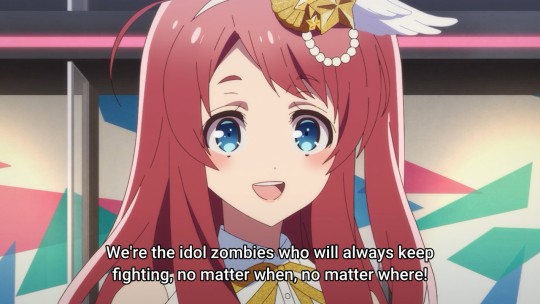
First off, you don't need to tell me that the following is a severe outlier opinion. We good? Ok. ZLSR is, in a word, subpar. I liked S1 back in the day, but it was already in the process of getting lazy towards the end. S2 continues this trend and is basically just another idol show. And as someone who actually does watch other idol shows I have to say that it's not a particularly good one of those either. The zombie gimmick has mostly stopped mattering and we're just doing what every idol show does, only with the odd occasional sight gag. The alleged subversive qualities mostly amount to a flashback for Yuugiri, which is admittedly the best part of the show but feels like it barely has anything to do with anything. Apart from that, it's a bunch of generic idol plots, rehashed character beats, shoddy attempts at twists (while not connecting to any setups from S1), and the obligatory "idols give us hope" ending, which is terribly hackneyed and flat out bad. Tae gets further memed into the ground, because of course she does. And there's stuff that was simply never good to begin with, like Kotarou and his comedy schtick, which gets truly insufferable now that there's no qualities to distract from it. It really makes me think that S1 wasn't even all that good to begin with and seems like an attempt to turn this surprise success into an easy money longrunner with no edge and no ambitions. "The idol show for people who don't watch idol shows" indeed, but not the way you mean it. 4/10
Bakuten
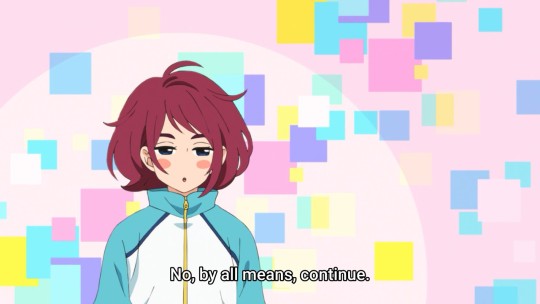
But not to dwell on the failures, with the second show we're already above the cut — barely. This one got my attention with its really impressive performance scenes early on and it totally sticks to that, which is even more impressive. But besides that? Well, this is by far the most predictable show in a season where I watched an unambitious Kiraralike and put ZLS on blast for having no ideas. The characters are a mixed bag, some are cool (Shida, Asawo), some are very annoying (Mashiro), but those are the supports. The main cast is extremely one-dimensional, which is fine until they try to heap a ton of pathos on their lead, which doesn't go well. But I guess execution matters, and Bakuten is slick enough to get by. Writing this down in stark daylight I feel like I overrated this show somewhat (I actually put it over the next one originally, which definitely doesn't hold up when thinking about it), but I was indeed mostly entertained. 6/10
Yakunara Mug Cup mo
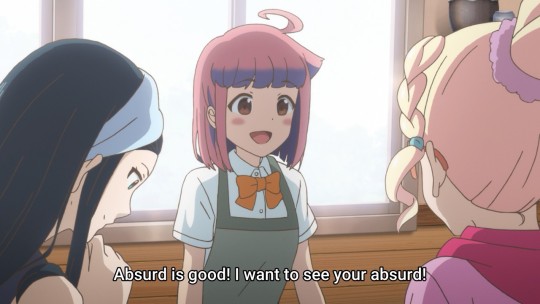
Yeah. Of course Mug Cup definitely doesn't invent or subvert anything either, but it's a pretty good Kiraralike that's always entertaining to watch. Explaining the qualities of such a nothing genre is as difficult as ever, but it mostly comes down to me liking the characters and it having nothing to annoy me. It's shorter than normal, which is a plus for slim shows like this. And yeah, you can make an excessive amount of dick jokes with the clay fondling. That helps too. Looks are just fine, pleasant but nothing out of the ordinary. Comfy low-effort anime. 6/10
Vivy: Fluorite Eye's Song
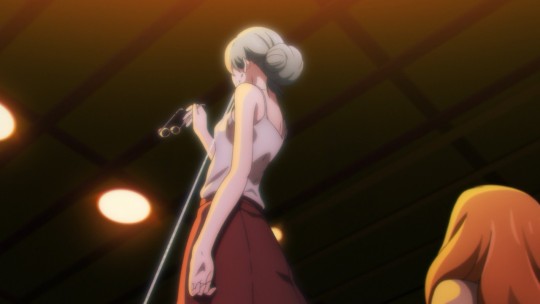
This one is decent, but sadly still a major letdown. Because the first few episodes of Vivy were excellent and kicked ass, but then it became increasingly clear that the writing can't cash the checks the ideas wrote while the action starts running into severely diminishing returns. Vivy just keeps slowly getting worse and worse as it goes on, not by a huge amount each episode but by the end there's a pretty sizeable gulf between potential and result. Going into detail would probably be a little much for this venue because there's a lot, but from the top level view the issue is that while Vivy has good fundamental ideas and steals at the right places, it just isn't a smart show — it's schlock, and by the end, poorly thought out schlock that tries to smooth out every problem with liberal application of the big feels hammer and le epic twist at that. Yeah, couldn't tell that the Re:Zero dude was aboard here, for sure. That said, it still works pretty well as entertaining schlock that is not to be taken too seriously, and the characters are generally just very fun to watch even when they're doing stupid things. Still, I can't in good conscience rate this higher than Beatless, a show that looks like butt but properly executes on its ideas. 6/10
Super Cub
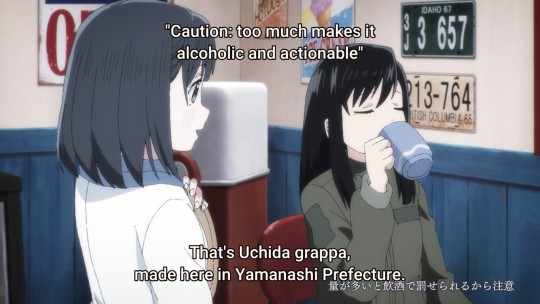
So this is 100% a Honda commercial, and I got really mad a Yuru Camp last season for being a blatant shill. Yet I'm feeling this, what gives? I think the main difference is that Super Cub is specifically a commercial for one product (and a very iconic product at that), while Yuru Camp is so all over the place that it ends up mostly a commercial for consumerism in general. And when Super Cub goes too hard on the product (which it does), it's at least pretty entertaining. That's something about Super Cub in general: It goes hard. Your regular Kiraralike this is not, because it's uncommonly slow, focused and moody - yes, it almost measures up to Yuru Camp at its best and demolishes it at its worst. Also, it's just extremely amusing to see sadblob Koguma grow a huge grizzly biker beard and become a badass outlaw dad to her goofy wife and cute daughter, all thanks to the power of afforable personal transportation. Needless to say, that can get unintentionally silly, but Super Cub has so much charm that it doesn't matter — it's great when it's good and still funny when it's not. 7/10
Shadows House
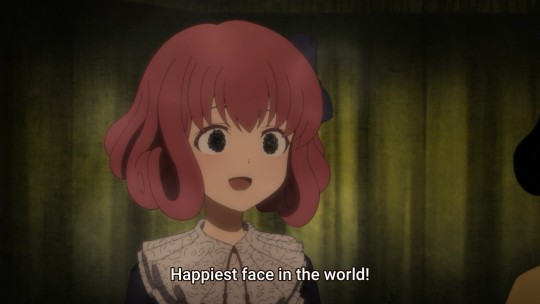
Shadows House turned up with a lot of potential, and I have to say it at least delivered on most of it. It has some problems; notably I'm not a fan of how the entire middle turned out to be a tournament arc of sorts that seems curiously inspired by Resident Evil memes, crest-shaped intentations and boulder punching included. I also think that this is a show that would be perfectly fine without explaining much, but I guess it is a shounen manga after all so we got dumped on eventually anyway. At least that came late - close relative Promised Neverland didn't show that much restraint. Shadows House is generally well written though, with great characters, interesting interactions and a great hook. But what really makes it memorable is that it's exceptionally good at the cute/creepy contrast, something that is often tried but rarely works as well as here, with great character designs and very appropriate production. I hope this gets a sequel, because it seems like it's just getting started. 7/10
SSSS.Dynazenon
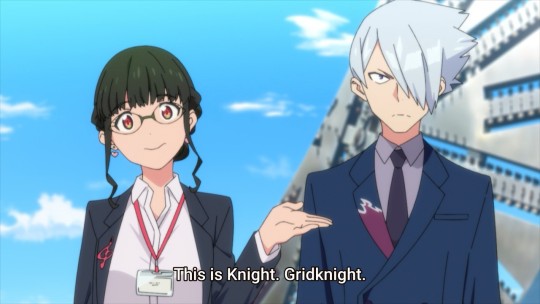
Coming in with a fondness for Gridman, Dynazenon didn't have to do much to convince me. The surprise though is that it's not a rehash even if it's basically the same show, a character drama where occasionally huge and goofy fights break out. Dynazenon is Gridman done better, and the interesting part is how it accomplishes this - mainly by being far more conventional. I do appreciate that Gridman went for something weird and almost experimental, but that only really paid off towards the end while most of the show was a distraction/holding pattern. It just didn't feel like there was enough material for a full series there, more like a movie maybe, if even that. Dynazenon fixes this by just being a TV show, with an actual cast of characters that each have their own arc. And by spreading the material this way, Dynazenon ends up having a lot more nuance than its intensely focused predecessor, while having the same themes and not actually being any deeper. In a way, Gridman ends up looking like the spinoff in retrospect, while Dynazenon is the full package. 8/10
Thunderbolt Fantasy S3
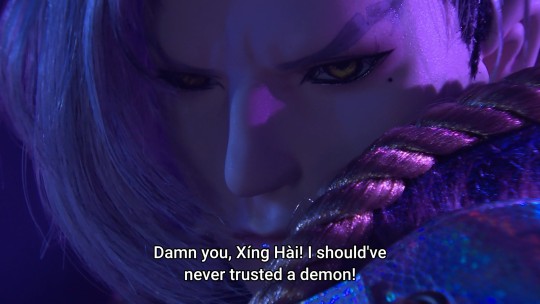
So how good was this season? So good that Thunderbolt Fantasy doesn't end up at the top, that's how. And all the elements that made Tbolt such a sure thing are still there, big hammy puppets doing stunts and scheming never gets old. However, I do have to note that at this point, the writing appears to have gotten too comfortable. I don't expect it to ever top the amazing S1 ending, but at this point it's like Tbolt has stopped trying to deliver on endings at all and seems in the process of retooling itself into a longrunner instead. Barely anything gets resolved in S3 (the climax is that the climax of S2 is resolved again, for good this time... maybe), and everything else is just setting up plotpoints for the next season. Tbolt is truly lucky that it doesn't actually need to resolve anything to be a great time, but at this point I have to say that I'd appreciate it if they wrapped it up with S4. 8/10
Nomad: Megalobox 2
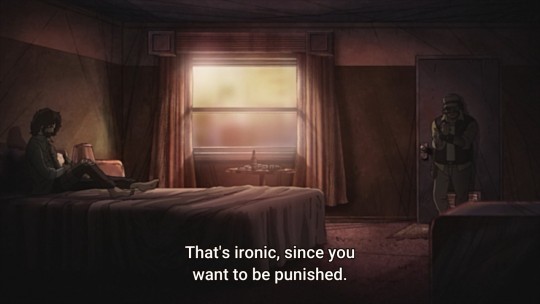
Speaking of sequels to shows I liked, Nomad doesn't so much improve upon its predecessor but steamrolls right over it. This is a tall order, since Megalobox was surprisingly good for a sports shounen and had a real nice, heartwarming ending that Nomad instantly negates for purposes of drama and everyone being extremely miserable. That sounds like a pretty terrible idea - and it would be, if Nomad wasn't as excellent as it is. To call it not the same show would be an understatement, because it's a true sequel, not just the same characters doing their thing some more, or new characters doing the same thing as the old ones did. Indeed my biggest problem with Megalobox was that it still closely adhered to its genre template and was very predictable; Nomad fixes this issue thoroughly. Nomad is about questioning what being a hotblooded shounen protagonist eventually leads you to, and how to fix everything you screwed up by being one. You could call it a deconstruction, but that term has been so abused for cynical, edgy "thing you like actually sucks" takes that I feel like it doesn't really fit here. Nomad isn't cynical at all, it's just a character drama about some boxers past their prime, and it being a sequel to a show that is indeed rather formulaic just enhances the experience. My biggest issue with it was that I really like what they did with Joe in this story, so the big focus on Mac's backstory felt like a distraction for a long time. But in the end that turned out to be absolutely necessary to make the ending work. The ending's just great, by the way, and I shall say not more about it. 9/10
Odd Taxi
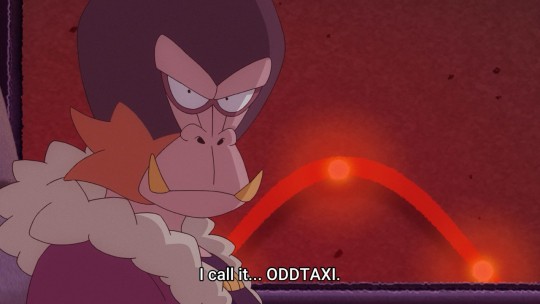
Yeah boy, here's the show that has apparently become somewhat of a "greatest show you didn't watch" meme, which I can feel smug about because I don't need YouTubers to tell me what's good and followed this from day one. Anyway, Odd Taxi is indeed great, the greatest show in a few years even. What starts out as seemingly a relaxed hangout show in the vein of Midnight Diners quickly turns into a psychological murder mystery while never losing its quirky humor. The character writing is outstanding, with even small bit players being on a level that the average anime wishes it could have for leads. And the rollout of the mystery is exemplary, with answers given and new questions raised every episode with a satisfying and logical payoff in the end. This is also the rare anime that has rock solid production from the first to the last second; it's never really flashy but excellently done and highly consistent nonetheless. And the music just owns. I have a few complaints, mainly that there's a few logical weaknesses in the story (which wouldn't even register in a lesser show, but sticks out here since the rest is so immaculately constructed) and that the ending overextends on the emotions when the rest of the show is so reserved and dry in comparison. But those are only the reasons why I didn't give it perfect marks, and I almost did that anyway. 9/10
#Zombieland Saga#bakuten#yakunara mug cup mo#vivy: fluorite eye's song#super cub#shadows house#ssss.dynazenon#thunderbolt fantasy#nomad megalo box#odd taxi#anime#review#spring2021
38 notes
·
View notes
Text
What Sherlock Doesn't Say to Molly
In light of Sherlock finally saying those three little words to Molly, I've been going back and tracing the progression of his feelings for Molly. And one of the things that stood out to me started with that often analyzed Sherlolly question... "Was Sherlock really oblivious about the coffee invite?" Because there is one thing that Sherlock has never said to Molly despite having ample opportunity to do so.
We've noted for ages that for all his supposed obliviousness Sherlock is socially perceptive enough to realize that John's questions about Sherlock's dating status could denote a romantic interest, and Sherlock immediately and politely shuts that down lest it create some misunderstanding or trouble with his new roommate. Not that John meant it in that way, anyhow, but an ounce of prevention...

So if Sherlock can recognize those social cues, how does he miss Molly's date invitation? One could argue that Molly's invite was more subtle and at a time when he was rather distracted by the experiment that he was conducting at the time... except for one rather large fly in the ointment.

For someone who is supposed to be oblivious to Molly, Sherlock is awfully damned observant. His reaction to Molly's explanation is equally problematic if we are supposed to believe that Sherlock is completely oblivious.

That is not the face of a man who is just going with the easy explanation. Even as Sherlock starts to turn back to his notes, his eyes are warily fixed on Molly and his expression and body language seems quite suspicious and nervous, rather like a man who has just discovered a large cobra that looks ready to strike. He knows there's more to this and that Molly is about to make a move. This would be the perfect time to lay things on the line, as he later does with John, but instead he feigns complete ignorance.
We've thrown out plenty of theories about his actions here before, but I think that in light of the progression between Sherlock and Molly it's worth a few new thoughts. I am honestly not sure if Sherlock knows why he plays dumb at this moment. As Mrs. Hudson points out in S4, Sherlock is actually all emotion... however in S1 Sherlock is firmly denying his emotions to the point that you have to wonder if he's even convinced himself.
For as concerned as Sherlock was about his observation that Molly had put on lipstick for him, he's equally concerned when he observes that she has taken it off after her failed invitation. And it is not at all inconceivable after all we've seen between them that a primal part of Sherlock actually enjoyed the fact that Molly was putting on that lipstick for his benefit.

He doesn't want her to push for something he thinks is beyond his capabilities, but he doesn't want her to completely lose interest in him either. Sherlock knows how to give Molly a compliment to get in her good graces, as he does in the very next episode, but he doesn't do that here either. A compliment this soon after her invite could provoke another invite. So he needles her instead, trying to provoke her into continuing to wear lipstick around him.

At heart I really don't think that Sherlock is behaving this way because he's a cold bastard who's merely trying to use Molly at the beginning of the series. I think that would have been his way of rationalizing his behavior in the first two episode, but I also think that from the beginning Sherlock at least subconsciously wants Molly's romantic attention. There could even be a conscious recognition of this desire on his part that he is internally at war with himself over, because there is a pattern of behavior here that continues even as their relationship escalates.
Let's skip ahead to the next big development in their relationship. The Christmas party where Sherlock discovers that Molly's regard for him is deeper than just a little meaningless flirting... after he humiliates both of them in front of their friends by trying to deduce her. She's dressed to the nines, she's carrying one specially wrapped present, and she's wearing that sexy red lipstick for someone--and Sherlock's deductions make it crystal clear that he does understand the psychology behind a woman trying to draw a man's attention to her lips. The "Jim" incident made it clear that Molly wasn't just sitting around and pining for Sherlock, and he might even have reason to believe that Molly has moved on after that particular scene in the lab. It's only after he has behaved like a complete bellend that Sherlock realizes that he was the object of her affection all along.
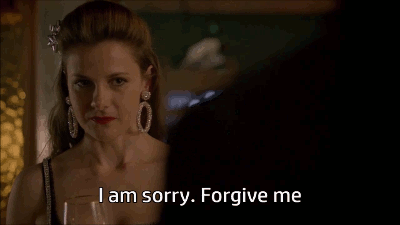
Sherlock giving his first ever apology in the series to Molly was a beautiful and important moment. Sherlock goes beyond that though by giving Molly a Christmas present in return.

After all the horrible things he'd said, Sherlock gives her a tender kiss on the cheek while wishing her a Merry Christmas. Leaving Molly (and the rest of the world) to wonder what to make of his actions. Was he so cruel before because he was jealous? Was he overcompensating for having just been a total jerk to her? It's not like Sherlock bothers to clarify with something like, "I'm flattered Molly, but I'm married to my work." Is that because he's trying to spare her more pain, or because he, himself, is confused especially with how Irene has been trying to stir his libido?
Between the kiss, Sherlock's lewd ringtone, and Sherlock identifying Irene at the morgue by "not her face"... Sherlock is definitely not giving Molly the impression that he is a man who is married to his work. No wonder she's looking for a little clarification on the subject while they are working alone in the lab.

And this was Sherlock's golden opportunity to tell her if he didn't want her affections, because he didn't have to make the answer about Molly. There is nobody around to make the situation humiliating. He could have simply answered, "Molly, I think you should know I consider myself married to my work, etc."
Because at this point Sherlock knows how Molly feels about him. All the Christmas deductions plus the "three x's... sign of romantic attachment." And yet again, Sherlock doesn't say it.

For someone who had zero trouble saying those words to John when he thought John might have a romantic interest, Sherlock goes out of his way to never say those words to Molly, even after he knows she is romantically interested in him. Even when Molly thinks that he is in love with Irene, Molly is still that helpful and loyal soul he can rely on. He's not going to lose her help in the lab or on his cases, so none of his potential earlier rationalizations for not telling her would apply anymore.
Instead, Sherlock goes on to tell her things like, "You can see me." "You do count. You've always counted, and I've always trusted you." "If I wasn't everything that you think I am, everything that I think I am, would you still want to help me?" And let's not forget his answer to "What do you need?" Obviously the only way to answer that was, "You." ;)
So Molly helps fake his death (and keep it secret for two years) and lets him use her bedroom for a bolthole, so I think we've reached a pretty high level of trust between them by the beginning of season 3, where Sherlock gets yet another scene where he could have said those words.

Yeah, so if Molly considers "have dinner" a viable ending to that sentence, Sherlock has obviously still never mentioned his "no dating" policy to her. They have a day filled with crime solving, meaningful looks, Sherlock's heartfelt thanks, declarations of Molly being "the one person who mattered most", another kiss from Sherlock, and an offer to take her to dinner after all... until Sherlock and Molly finally have to acknowledge that she's currently engaged to another man.
And do you know when else Sherlock would have had an opportunity to tell Molly that he was married to his work and not interested in romantic entanglements? During whatever off-screen conversation that had about saying "I love you" to each other during the whole bomb threat scene. Of course, with the way that Molly was beaming the world's biggest smile and rushing towards Sherlock's favorite spot in the ending montage, I think it's safe to say that Sherlock never said those words to her then either.
#sherlolly#molly x sherlock#molly hooper#sherlock holmes#mollock#sherlolly meta#sherlock#bbc sherlock
1K notes
·
View notes